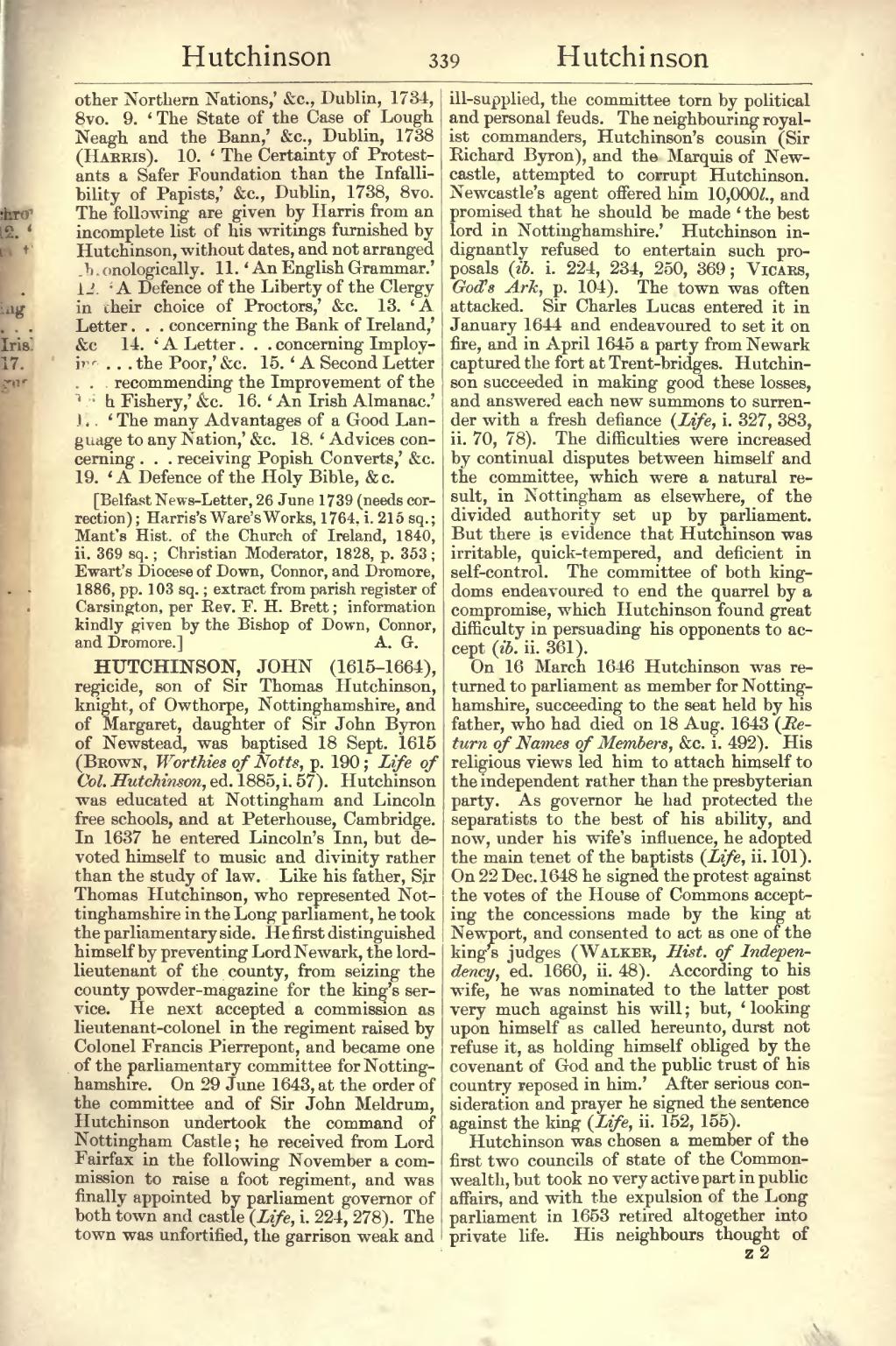- 'The State of the Case of Lough Neagh and the Bann,' &c., Dublin, 1738 (Harris).
- 'The Certainty of Protestants a Safer Foundation than the Infallibility of Papists,' &c., Dublin, 1738, 8vo. The following are given by Harris from an incomplete list of his writings furnished by Hutchinson, without dates, and not arranged chronologically.
- 'An English Grammar.';
- 'A Defence of the Liberty of the Clergy in their choice of Proctors,' &c.
- 'A Letter … concerning the Bank of Ireland,' &c.
- ' A Letter … concerning Imploying … the Poor,' &c.
- 'A Second Letter … recommending the Improvement of the Irish Fishery,' &c.
- ' An Irish Almanac.'
- 'The many Advantages of a Good Language to any Nation,' &c.
- 'Advices concerning … receiving Popish Converts,' &.c.
- 'A Defence of the Holy Bible, &c.
other Northern Nations,' &c., Dublin, 1734, 8vo.
[Belfast News-Letter, 26 June 1739 (needs correction); Harris's Ware's Works, 1764, i. 215 sq.; Mant's Hist. of the Church of Ireland, 1840, ii. 369 sq.; Christian Moderator, 1828, p. 353; Ewart's Diocese of Down, Connor, and Dromore, 1886, pp. 103 sq.; extract from parish register of Carsington, per Rev. F. H. Brett; information kindly given by the Bishop of Down, Connor, and Dromore.]
HUTCHINSON, JOHN (1615–1664), regicide, son of Sir Thomas Hutchinson, knight, of Owthorpe, Nottinghamshire, and of Margaret, daughter of Sir John Byron of Newstead, was baptised 18 Sept. 1615 (Brown, Worthies of Notts, p. 190; Life of Col. Hutchinson, ed. 1885, i.57). Hutchinson was educated at Nottingham and Lincoln free schools, and at Peterhouse, Cambridge. In 1637 he entered Lincoln's Inn, but devoted himself to music and divinity rather than the study of law. Like his father, Sir Thomas Hutchinson, who represented Nottinghamshire in the Long parliament, he took, the parliamentary side. He first distinguished himself by preventing Lord Newark, the lord-lieutenant of the county, from seizing the county powder-magazine for the king's service. He next accepted a commission as lieutenant-colonel in the regiment raised by Colonel Francis Pierrepont, and became one of the parliamentary committee for Nottinghamshire. On 29 June 1643, at the order of the committee and of Sir John Meldrum, Hutchinson undertook the command of Nottingham Castle; he received from Lord Fairfax in the following November a commission to raise a foot regiment, and was finally appointed by parliament governor of both town and castle (Life, i. 224, 278). The town was unfortified, the garrison weak and: ill-supplied, the committee torn by political and personal feuds. The neighbouring royalist commanders, Hutchinson's cousin (Sir Richard Byron), and the Marquis of Newcastle, attempted to corrupt Hutchinson. Newcastle's agent offered him 10,000l., and promised that he should be made 'the best lord in Nottinghamshire.' Hutchinson indignantly refused to entertain such proposals (ib. i. 224, 234, 250, 369; Vicars, God's Ark, p. 104). The town was often attacked. Sir Charles Lucas entered it in January 1644 and endeavoured to set it on fire, and in April 1645 a party from Newark captured the fort at Trent-bridges. Hutchinson succeeded in making good these losses, and answered each new summons to surrender with a fresh defiance (Life, i. 327, 383, ii. 70, 78). The difficulties were increased by continual disputes between himself and the committee, which were a natural result, in Nottingham as elsewhere, of the divided authority set up by parliament. But there is evidence that Hutchinson was irritable, quick-tempered, and deficient in self-control. The committee of both kingdoms endeavoured to end the quarrel by a compromise, which Hutchinson found great difficulty in persuading his opponents to accept (ib. ii. 361).
On 16 March 1646 Hutchinson was returned to parliament as member for Nottinghamshire, succeeding to the seat held by his father, who had died on 18 Aug. 1643 (Return of Names of Members, &c. i. 492). His religious views led him to attach himself to the independent rather than the presbyterian party. As governor he had protected the separatists to the best of his ability, and now, under his wife's influence, he adopted the main tenet of the baptists (Life, ii. 101). On 22 Dec. 1648 he signed the protest against the votes of the House of Commons accepting the concessions made by the king at Newport, and consented to act as one of the king's judges (Walker, Hist. of Independency, ed. 1660, ii. 48). According to his wife, he was nominated to the latter post very much against his will; but, looking upon himself as called hereunto, durst not refuse it, as holding himself obliged by the covenant of God and the public trust of his country reposed in him.' After serious consideration and prayer he signed the sentence against the king (Life, ii. 152, 155).
Hutchinson was chosen a member of the first two councils of state of the Commonwealth, but took no very active part in public affairs, and with the expulsion of the Long parliament in 1653 retired altogether into private life. His neighbours thought of
